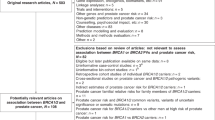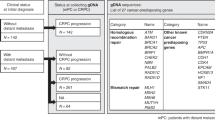Abstract
BACKGROUND:
To evaluate whether single-nucleotide polymorphisms (SNPs) reflecting common variation in the tumor suppressor BRCA1 affect prostate cancer outcomes. Because radiation therapy (RT) induces DNA damage, we hypothesized that common variation in BRCA1 has a role in progression to lethal prostate cancer, particularly in patients receiving RT.
Methods:
We followed 802 men diagnosed with localized prostate cancer (cT1-T3/N0/M0) who were treated with RT in the US Health Professionals Follow-up Study (HPFS) and Physicians’ Health Study (PHS), for progression to lethal prostate cancer. Six SNPs (rs3737559, rs1799950, rs799923, rs915945, rs4474733 and rs8176305) were genotyped in HPFS to capture common variation across BRCA1. rs4474733 and rs8176305 were also evaluated in the PHS cohort. Cox proportional hazards models were used to estimate per-allele hazard ratios (HR) and 95% confidence intervals (CI) stratified by primary treatment.
Results:
In the RT group (n=802), 71 men progressed to lethal disease during a mean follow-up of 12 years. We found that two SNPs, rs4473733 (HR: 0.65; 95% CI 0.42–0.99) and rs8176305 (HR: 2.03; 95% CI 1.33–3.10), were associated with lethal prostate cancer in men receiving RT.
Conclusions:
Common variation in BRCA1 may influence clinical outcomes in patients receiving RT for localized prostate cancer by modifying the response to RT. Our findings merit further follow-up studies to validate these SNPs and better understand their functional and biological significance.
This is a preview of subscription content, access via your institution
Access options
Subscribe to this journal
Receive 4 print issues and online access
$259.00 per year
only $64.75 per issue
Buy this article
- Purchase on Springer Link
- Instant access to full article PDF
Prices may be subject to local taxes which are calculated during checkout
Similar content being viewed by others
References
D'Amico AV, Whittington R, Malkowicz SB, Schultz D, Blank K, Broderick GA et al. Biochemical outcome after radical prostatectomy, external beam radiation therapy, or interstitial radiation therapy for clinically localized prostate cancer. JAMA 1998; 280: 969–974.
Kupelian PA, Elshaikh M, Reddy CA, Zippe C, Klein EA . Comparison of the efficacy of local therapies for localized prostate cancer in the prostate-specific antigen era: a large single-institution experience with radical prostatectomy and external-beam radiotherapy. J Clin Oncol 2002; 20: 3376–3385.
Kerns SL, Stone NN, Stock RG, Rath L, Ostrer H, Rosenstein BS . A 2-stage genome-wide association study to identify single nucleotide polymorphisms associated with development of urinary symptoms after radiotherapy for prostate cancer. J Urol 2013; 190: 102–108.
Kerns SL, Stock RG, Stone NN, Blacksburg SR, Rath L, Vega A et al. Genome-wide association study identifies a region on chromosome 11q14.3 associated with late rectal bleeding following radiation therapy for prostate cancer. Radiother Oncol 2013; 107: 372–376.
Kerns SL, Stock R, Stone N, Buckstein M, Shao Y, Campbell C et al. A 2-stage genome-wide association study to identify single nucleotide polymorphisms associated with development of erectile dysfunction following radiation therapy for prostate cancer. Int J Radiat Oncol Biol Phys 2013; 85: e21–e28.
Barnett GC, Thompson D, Fachal L, Kerns S, Talbot C, Elliott RM et al. A genome wide association study (GWAS) providing evidence of an association between common genetic variants and late radiotherapy toxicity. Radiother Oncol 2014; 111: 178–185.
Abecasis GR, Auton A, Brooks LD, DePristo MA, Durbin RM, Handsaker RE et al. An integrated map of genetic variation from 1,092 human genomes. Nature 2012; 491: 56–65.
Henriquez-Hernandez LA, Valenciano A, Foro-Arnalot P, Alvarez-Cubero MJ, Cozar JM, Suarez-Novo JF et al. Single nucleotide polymorphisms in DNA repair genes as risk factors associated to prostate cancer progression. BMC Med Genet 2014; 15: 143.
Castro E, Eeles R . The role of BRCA1 and BRCA2 in prostate cancer. Asian J Androl 2012; 14: 409–414.
Mullan PB, Quinn JE, Harkin DP . The role of BRCA1 in transcriptional regulation and cell cycle control. Oncogene 2006; 25: 5854–5863.
Rosen EM . BRCA1 in the DNA damage response and at telomeres. Front Genet 2013; 4: 85.
Fiorentino M, Judson G, Penney K, Flavin R, Stark J, Fiore C et al. Immunohistochemical expression of BRCA1 and lethal prostate cancer. Cancer Res 2010; 70: 3136–3139.
Castro E, Goh C, Olmos D, Saunders E, Leongamornlert D, Tymrakiewicz M et al. Germline BRCA mutations are associated with higher risk of nodal involvement, distant metastasis, and poor survival outcomes in prostate cancer. J Clin Oncol 2013; 31: 1748–1757.
Douglas JA, Levin AM, Zuhlke KA, Ray AM, Johnson GR, Lange EM et al. Common variation in the BRCA1 gene and prostate cancer risk. Cancer Epidemiol Biomark Prev 2007; 16: 1510–1516.
Giovannucci E, Ascherio A, Rimm EB, Stampfer M, Colditz G, Willett W . Intake of carotenoids and retinol in relation to risk of prostate cancer. J Natl Cancer Inst 1995; 87: 1767–1776.
Barry M, Dhillon PK, Stampfer MJ, Perner S, Ma J, Giovannucci E et al. alpha-Methylacyl-CoA racemase expression and lethal prostate cancer in the Physicians' Health Study and Health Professionals Follow-up Study. Prostate 2012; 72: 301–306.
Cookson MS, Aus G, Burnett AL, Canby-Hagino ED, D'Amico AV, Dmochowski RR et al. Variation in the definition of biochemical recurrence in patients treated for localized prostate cancer: the American Urological Association Prostate Guidelines for Localized Prostate Cancer Update Panel report and recommendations for a standard in the reporting of surgical outcomes. J Urol 2007; 177: 540–545.
Roach M 3rd, Hanks G, Thames H Jr., Schellhammer P, Shipley WU, Sokol GH et al. Defining biochemical failure following radiotherapy with or without hormonal therapy in men with clinically localized prostate cancer: recommendations of the RTOG-ASTRO Phoenix Consensus Conference. I J Radiat Oncol Biol Phys 2006; 65: 965–974.
Schoenfeld JD, Margalit DN, Kasperzyk JL, Shui IM, Rider JR, Epstein MM et al. A single nucleotide polymorphism in inflammatory gene RNASEL predicts outcome after radiation therapy for localized prostate cancer. Clin Cancer Res 2013; 19: 1612–1619.
Bancroft EK, Page EC, Castro E, Lilja H, Vickers A, Sjoberg D et al. Targeted prostate cancer screening in BRCA1 and BRCA2 mutation carriers: results from the Initial screening round of the IMPACT Study. Eur Urol 2014; 66: 489–499.
Castro E, Goh C, Leongamornlert D, Saunders E, Tymrakiewicz M, Dadaev T et al. Effect of BRCA mutations on metastatic relapse and cause-specific survival after radical treatment for localised prostate cancer. Eur Urol 2014; 68: 186–193.
Lange EM, Gillanders EM, Davis CC, Brown WM, Campbell JK, Jones M et al. Genome-wide scan for prostate cancer susceptibility genes using families from the University of Michigan prostate cancer genetics project finds evidence for linkage on chromosome 17 near BRCA1. Prostate 2003; 57: 326–334.
Szulkin R, Karlsson R, Whitington T, Aly M, Gronberg H, Eeles RA et al. Genome-wide association study of prostate cancer-specific survival. Cancer Epidemiol Biomark Prev 2015; 24: 1796–86.
Kearns JT, Lapin B, Wang E, Roehl KA, Cooper P, Catalona WJ et al. Associations between iCOGS single nucleotide polymorphisms and upgrading in both surgical and active surveillance cohorts of men with prostate cancer. Eur Urol 2015; 69: 223–228.
Young A, Berry R, Holloway AF, Blackburn NB, Dickinson JL, Skala M et al. RNA-seq profiling of a radiation resistant and radiation sensitive prostate cancer cell line highlights opposing regulation of DNA repair and targets for radiosensitization. BMC Cancer 2014; 14: 808.
Damaraju S, Murray D, Dufour J, Carandang D, Myrehaug S, Fallone G et al. Association of DNA repair and steroid metabolism gene polymorphisms with clinical late toxicity in patients treated with conformal radiotherapy for prostate cancer. Clin Cancer Res 2006; 12: 2545–2554.
Ricks-Santi LJ, Nie J, Marian C, Ochs-Balcom HM, Trevisan M, Edge SB et al. BRCA1 polymorphisms and breast cancer epidemiology in the Western New York exposures and breast cancer (WEB) study. Genet Epidemiol 2013; 37: 504–511.
Durocher F, Shattuck-Eidens D, McClure M, Labrie F, Skolnick MH, Goldgar DE et al. Comparison of BRCA1 polymorphisms, rare sequence variants and/or missense mutations in unaffected and breast/ovarian cancer populations. Hum Mol Genet 1996; 5: 835–842.
Kumar P, Henikoff S, Ng PC . Predicting the effects of coding non-synonymous variants on protein function using the SIFT algorithm. Nat Protoc 2009; 4: 1073–1081.
Adzhubei IA, Schmidt S, Peshkin L, Ramensky VE, Gerasimova A, Bork P et al. A method and server for predicting damaging missense mutations. Nat Methods 2010; 7: 248–249.
Capriotti E, Fariselli P, Casadio R . I-Mutant2.0: predicting stability changes upon mutation from the protein sequence or structure. Nucleic Acids Res 2005; 33 (Web Server issue): W306–W310.
Acknowledgements
We are grateful to the participants and staff of the HPFS and PHS cohorts for their valuable contributions as well as the following state cancer registries for their help: AL, AZ, AR, CA, CO, CT, DE, FL, GA, ID, IL, IN, IA, KY, LA, ME, MD, MA, MI, NE, NH, NJ, NY, NC, ND, OH, OK, OR, PA, RI, SC, TN, TX, VA, WA, WY. The Dana-Farber/Harvard Center Genotyping Core Facility performed the genotyping for this project. The authors assume full responsibility for analyses and interpretation of these data. This project was supported by the US Army Prostate Cancer Program Idea Development Award. IMS supported by (T32 CA-09001) and a Department of Defense Prostate Cancer Research Program post-doctoral training award. PLN was supported by a grant from an anonymous family foundation and LAM and PLN are supported by the Prostate Cancer Foundation. PHS was supported by grants CA34944, CA40360, CA097193, HL26490 and HL34595. HPFS was supported by grants CA133891, CA141298, and P01CA055075 and UM1 CA167552.
Author information
Authors and Affiliations
Corresponding author
Ethics declarations
Competing interests
The authors declare no conflict of interest.
Additional information
Supplementary Information accompanies the paper on the Prostate Cancer and Prostatic Diseases website
Rights and permissions
About this article
Cite this article
Sanchez, A., Schoenfeld, J., Nguyen, P. et al. Common variation in BRCA1 may have a role in progression to lethal prostate cancer after radiation treatment. Prostate Cancer Prostatic Dis 19, 197–201 (2016). https://doi.org/10.1038/pcan.2016.4
Received:
Revised:
Accepted:
Published:
Issue Date:
DOI: https://doi.org/10.1038/pcan.2016.4



